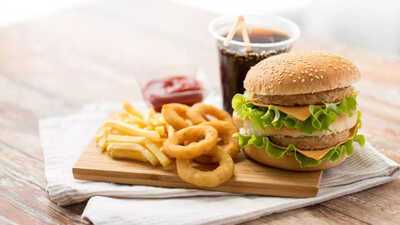Diet plays a crucial role in mental health, influencing anxiety, depression, and overall mood. While lifestyle and genetics are important factors, certain foods and beverages can exacerbate stress, trigger irritability, or worsen depressive symptoms. Consuming high-sugar drinks, processed snacks, artificial sweeteners, and excessive caffeine can create energy spikes and crashes, negatively impacting both brain and body. Understanding which foods to limit and choosing healthier alternatives can stabilise mood, improve mental resilience, and support overall well-being. According to multiple studies from Harvard, NIH, and Frontiers, these are some common dietary triggers for anxiety and depression.
Foods that may trigger anxiety and depression
Fruit juice

While fruit is healthy, fruit juice lacks the fiber of whole fruit. Fiber slows the absorption of sugar, preventing sharp spikes and crashes in blood glucose. Drinking juice can quickly raise your energy and then drop it, leaving you feeling irritable and hungry. Instead, eat whole fruits for sustained energy and drink water when you’re thirsty.
Regular soda
Sugar-sweetened drinks, including soda, provide rapid sugar spikes with little nutritional value. According to the research published in NIH, there’s a direct link between excessive sugar intake and increased risk of depression. If you crave something fizzy, try sparkling water with a splash of natural fruit juice. It offers the sensation of soda without the excessive sugar.
Diet soda
Even though it contains little or no sugar, diet soda isn’t harmless. Artificial sweeteners like aspartame and high caffeine levels can contribute to depressive symptoms and worsen anxiety. Limiting diet sodas and choosing naturally flavored water or herbal teas is a safer choice.
White bread and toast

According to Harvard Health Publishing, highly processed white bread converts rapidly into sugar, leading to energy spikes and crashes that may aggravate anxiety or low mood. Swap white bread for whole-grain varieties, which provide fiber and support more stable blood sugar levels.
‘Light’ or sugar-free dressings
Many pre-packaged dressings use artificial sweeteners instead of sugar. According to a study published in NIH, ingredients like aspartame may negatively affect mood and contribute to anxiety. Making homemade dressings with olive oil, lemon juice, or vinegar can help you avoid these additives while enjoying a healthier flavor.
Ketchup
While it may seem harmless, ketchup is high in sugar, even in “light” varieties, which may also contain artificial sweeteners. Excess sugar and additives can worsen mood swings and anxiety. Consider homemade tomato salsa with spices like cayenne for a flavorful, healthier alternative.
Coffee

Caffeine affects everyone differently. According to a study published in Frontiers, for some, it can increase nervousness, jitteriness, and sleep disruption, factors that intensify anxiety and depressive symptoms. If caffeine impacts you negatively, consider decaf or gradually reduce intake. For those who tolerate it well, moderate coffee consumption may actually improve alertness and mood.
Energy drinks
Energy drinks often contain excessive caffeine, sugar, and other stimulants such as guarana, which can trigger heart palpitations, anxiety, and sleep disturbances. Instead, stick to water, herbal tea, or a piece of fruit for a natural energy boost.
Alcohol
Even moderate alcohol intake can interfere with sleep, which is closely tied to mental health. While occasional drinks may relax you, overconsumption increases anxiety and depressive symptoms. Limiting to moderate levels—up to one drink a day for women and two for men—can help reduce these risks.
Frosting and trans fats
According to a study published in NIH, sugary frostings and foods containing partially hydrogenated oils are linked to depression. These trans fats are found in fried foods, packaged snacks, and baked goods. Focus on “good” fats from olive oil, nuts, avocado, and fatty fish, which support brain health and mood stability.
Soy sauce and gluten-containing processed foods
For those sensitive to gluten, soy sauce and other processed foods can trigger sluggishness, anxiety, and depressive symptoms. Always check labels and avoid items containing gluten if you notice negative effects.
Processed and fried foods

Frequent consumption of processed meats, fried foods, pastries, high-fat dairy, and refined cereals is linked to higher rates of anxiety and depression. A diet focused on whole grains, vegetables, fruits, and fish is associated with more balanced moods and improved mental health.
Doughnuts and sugary treats

While occasional treats are fine, doughnuts are high in sugar, unhealthy fats, and refined flour. Eating them regularly can worsen mood swings and contribute to anxiety or low mood. Make indulgences rare rather than routine.
What you eat plays a crucial role in managing anxiety and depression. Limiting sugar, highly processed foods, artificial sweeteners, and excess caffeine or alcohol can reduce mood swings and anxiety symptoms. Focus on whole grains, fiber-rich fruits and vegetables, healthy fats, and proper hydration. Small dietary changes, combined with lifestyle measures like exercise, sleep, and stress management, can significantly improve mental well-being. By making mindful food choices, you support both your body and mind, fostering a more balanced, resilient state of health.
Also Read: Coconut meat doesn’t raise blood sugar level: A diabetes-friendly snack and 3 groups of people who should avoid it
Foods that may trigger anxiety and depression
Fruit juice

While fruit is healthy, fruit juice lacks the fiber of whole fruit. Fiber slows the absorption of sugar, preventing sharp spikes and crashes in blood glucose. Drinking juice can quickly raise your energy and then drop it, leaving you feeling irritable and hungry. Instead, eat whole fruits for sustained energy and drink water when you’re thirsty.
Regular soda
Sugar-sweetened drinks, including soda, provide rapid sugar spikes with little nutritional value. According to the research published in NIH, there’s a direct link between excessive sugar intake and increased risk of depression. If you crave something fizzy, try sparkling water with a splash of natural fruit juice. It offers the sensation of soda without the excessive sugar.
Diet soda
Even though it contains little or no sugar, diet soda isn’t harmless. Artificial sweeteners like aspartame and high caffeine levels can contribute to depressive symptoms and worsen anxiety. Limiting diet sodas and choosing naturally flavored water or herbal teas is a safer choice.
White bread and toast
According to Harvard Health Publishing, highly processed white bread converts rapidly into sugar, leading to energy spikes and crashes that may aggravate anxiety or low mood. Swap white bread for whole-grain varieties, which provide fiber and support more stable blood sugar levels.
‘Light’ or sugar-free dressings
Many pre-packaged dressings use artificial sweeteners instead of sugar. According to a study published in NIH, ingredients like aspartame may negatively affect mood and contribute to anxiety. Making homemade dressings with olive oil, lemon juice, or vinegar can help you avoid these additives while enjoying a healthier flavor.
Ketchup
While it may seem harmless, ketchup is high in sugar, even in “light” varieties, which may also contain artificial sweeteners. Excess sugar and additives can worsen mood swings and anxiety. Consider homemade tomato salsa with spices like cayenne for a flavorful, healthier alternative.
Coffee
Caffeine affects everyone differently. According to a study published in Frontiers, for some, it can increase nervousness, jitteriness, and sleep disruption, factors that intensify anxiety and depressive symptoms. If caffeine impacts you negatively, consider decaf or gradually reduce intake. For those who tolerate it well, moderate coffee consumption may actually improve alertness and mood.
Energy drinks
Energy drinks often contain excessive caffeine, sugar, and other stimulants such as guarana, which can trigger heart palpitations, anxiety, and sleep disturbances. Instead, stick to water, herbal tea, or a piece of fruit for a natural energy boost.
Alcohol
Even moderate alcohol intake can interfere with sleep, which is closely tied to mental health. While occasional drinks may relax you, overconsumption increases anxiety and depressive symptoms. Limiting to moderate levels—up to one drink a day for women and two for men—can help reduce these risks.
Frosting and trans fats
According to a study published in NIH, sugary frostings and foods containing partially hydrogenated oils are linked to depression. These trans fats are found in fried foods, packaged snacks, and baked goods. Focus on “good” fats from olive oil, nuts, avocado, and fatty fish, which support brain health and mood stability.
Soy sauce and gluten-containing processed foods
For those sensitive to gluten, soy sauce and other processed foods can trigger sluggishness, anxiety, and depressive symptoms. Always check labels and avoid items containing gluten if you notice negative effects.
Processed and fried foods
Frequent consumption of processed meats, fried foods, pastries, high-fat dairy, and refined cereals is linked to higher rates of anxiety and depression. A diet focused on whole grains, vegetables, fruits, and fish is associated with more balanced moods and improved mental health.
Doughnuts and sugary treats

While occasional treats are fine, doughnuts are high in sugar, unhealthy fats, and refined flour. Eating them regularly can worsen mood swings and contribute to anxiety or low mood. Make indulgences rare rather than routine.
What you eat plays a crucial role in managing anxiety and depression. Limiting sugar, highly processed foods, artificial sweeteners, and excess caffeine or alcohol can reduce mood swings and anxiety symptoms. Focus on whole grains, fiber-rich fruits and vegetables, healthy fats, and proper hydration. Small dietary changes, combined with lifestyle measures like exercise, sleep, and stress management, can significantly improve mental well-being. By making mindful food choices, you support both your body and mind, fostering a more balanced, resilient state of health.
Also Read: Coconut meat doesn’t raise blood sugar level: A diabetes-friendly snack and 3 groups of people who should avoid it
You may also like

Parents of girl, 11, who drowned in swimming pool recall watching her last breath on CCTV

Role of UP in developed India will be decisive: CM Yogi concludes Vision Document debate in Assembly

Russia's Klyuchevskoy Volcano eruption ends, leaving new scoria cone in Kamchatka

Jack Wilshere snubs Arsenal return after being approached by Gunners over new role

Crystal Palace want £40m Liverpool star as Marc Guehi swap 'not ruled out'






